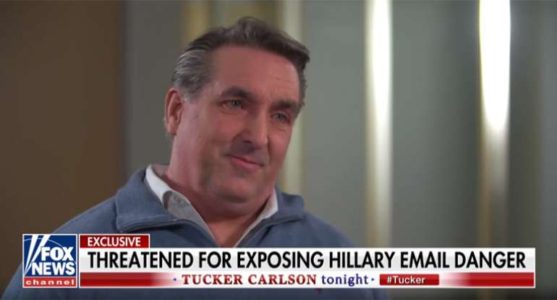
Former federal intelligence watchdog Charles McCullough on Fox News. Image via YouTube
A former government watchdog says Hillary Clinton’s campaign threatened retribution against him and his loved ones when he raised concerns about classified info on Clinton’s private email server while it was being investigated in 2016.
“There was personal blowback. Personal blowback to me, to my family, to my office,” former Intelligence Community Inspector General Charles McCullough III told Fox News’ Catherine Herridge on Monday.
He said the Clinton campaign even put out word that it planned to fire him if Clinton won the 2016 election. Democrats in Congress also mounted what he thought looked like a coordinated campaign to intimidate him.
McCullough, an Obama appointee, became inspector general after “more than two decades at the FBI, Treasury and intelligence community,” Fox News reported. He explained how the probe was quickly politicized and his office marginalized by Democrats in Congress.
The intimidation campaign intensified in January 2016, after McCullough notified senior intelligence and foreign relations committee leaders that “several dozen emails containing classified information” were determined to be “at the CONFIDENTIAL, SECRET, AND TOP SECRET/SAP levels.”
A government source involved with the review told Fox News at the time that seven of those emails had been deemed by the intelligence community to be so sensitive and so potentially damaging to national security that they could never be released under any circumstances.
“All of a sudden I became a shill of the right,” McCullough recalled. “And I was told by members of Congress, ‘Be careful. You’re losing your credibility. You need to be careful. There are people out to get you.’”
McCullough said then-director of national intelligence James Clapper was also disturbed by the Clinton email findings, calling the former sec. of State’s behavior “extremely reckless” during an in-person meeting about a year before the presidential election. “[Clapper] was as off-put as the rest of us were,” he told Herridge.
He said his team was marginalized after the Clapper meeting. “I was told by senior officials to keep [Clapper] out of it,” he said.
As one of the few people who viewed the 22 Top Secret Clinton emails deemed too classified to release under any circumstances, the former IG said, “There was a very good reason to withhold those emails … there would have been harm to national security.” McCullough went further, telling Fox News that “sources and methods, lives and operations” could be put at risk.
Some of those email exchanges contained Special Access Privilege (SAP) information characterized by intel experts as “above top secret.”
WikiLeaks documents show the campaign was formulating talking points as the review of 30,000 Clinton emails was ongoing.
The campaign team wrote in August 2015 that “Clinton only used her account for unclassified email. When information is reviewed for public release, it is common for information previously unclassified to be upgraded to classified.”
“There was an effort … certainly on the part of the campaign to mislead people into thinking that there was nothing to see here,” McCullough said, stating what was obvious to many observers at the time.
In March 2016, seven senior Democrats entered the fray, sending a letter to McCullough and his State Department counterpart expressing their reservations about the impartiality of the Clinton email review.
McCullough, of course, wasn’t the one making the decisions regarding the classification of Clinton’s emails, he was just, as Herridge notes, “passing along the findings of the individual agencies” that had the final say on classification.
The watchdog said he thought there was “a coordinated strategy” targeting him based on the evidence he saw.
Six weeks before the election, McCullough said Sen. Dianne Feinstein’s office tried to pressure him to respond to the letter – which Feinstein had co-signed.
“I thought that any response to that letter would just hyper-politicize the situation,” McCullough said. “I recall even offering to resign, to the staff director. I said, ‘Tell [Feinstein] I’ll resign tonight. I’d be happy to go. I’m not going to respond to that letter. It’s just that simple.”
The pressure intensified as Election Day approached and McCullough and another senior government investigator on the email case were threatened.
“I was told in no uncertain terms, by a source directly from the campaign, that we would be the first two to be fired — with [Clinton’s] administration. That that was definitely going to happen,” he said.
“I was, in this context, a whistleblower. I was explaining to Congress — I was doing exactly what they had expected me to do…and all of a sudden I was the enemy,” he said.
McCullough said the pressure he faced from Clinton’s former team at the State Department — especially top official Patrick Kennedy — was so intense, it felt like “a security problem.”
“State Department management didn’t want us there,” he said. “We knew we had had a security problem at this point. We had a possible compromise.”
No one was charged after more than 2,100 classified, government-business emails passed through Clinton’s personal, unsecure server.
Herridge asked McCullough what would have happened to him if he had done such a thing.
He answered: “I’d be sitting in Leavenworth right now.”
After Herridge’s exclusive report, Tucker Carlson had former Clinton adviser Richard Goodstein on for his reaction. His input was as laughably hackish as you’d expect and probably not worth your time.
Source: PJMedia
